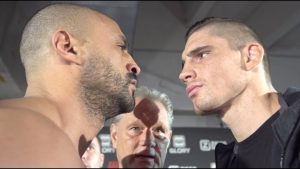Because of all the wonderful and extraordinary selves that are currently on display if you are bored enough to browse the Internet, it is easy to misconstrue the nature of self-confidence. Our Internet heroes have grandiose that make them seem independent. The veil of their staged independence is paper-thin, but no-one cares to lift it lest they spoil the entertainment.
Of course, selves only have any meaning in relation to other selves. Self-confidence only emerges, as a comfortable emotion or as a painful lack, when there is more than one self involved. A lone survivor of a plane crash can be described as ‘courageous’ and ‘confident’ but this is a translation back into the language we are familiar with. Sure, the wilderness survivor trusts himself, relies on himself. When he stares in the eyes of a beast, he might feel fear or blood lust, but these emotions are to be distinguished from self-confidence, for the simple reason there is no self involved.
 The abstract and shared concepts that are the unique accomplishment of our species, are of no use against a furry nonverbal opponent. It would most likely be a fatal distraction from the bloody reality of claws and jaws. In our society on the other hand, navigating the delicate web of power relations is what enables us to firmly position ourselves within that web. In other words: we develop our selves as we are situated in power relations with our fellow humans. In puberty, we discover the boundaries of our parents and peers, and develop certain expectations we adjust our behavior to. These expectations enable us to ponder power relations before they occur.
The abstract and shared concepts that are the unique accomplishment of our species, are of no use against a furry nonverbal opponent. It would most likely be a fatal distraction from the bloody reality of claws and jaws. In our society on the other hand, navigating the delicate web of power relations is what enables us to firmly position ourselves within that web. In other words: we develop our selves as we are situated in power relations with our fellow humans. In puberty, we discover the boundaries of our parents and peers, and develop certain expectations we adjust our behavior to. These expectations enable us to ponder power relations before they occur.
We know that we can deal with the expectations we have of each other in a different way than we would with expectations of natural events. If I know it is going to rain, my self-confidence would only warm up my brain and waste precious energy. When in human company, however, I can use language games and thereby avoid physical violence. I can put into words which position in the web of power that our social fabric is I deem fittest for my own survival. And if I do so, I become aware of the relations between me and the others. I will say only that the self is fundamentally relational. My intention is to share a modest observation, not a conclusive philosophical tractate on some alleged ‘nature’ of the self.
When the self is deeply relational, self-confidence becomes a quality of those relations. It is not (only) trust in one’s self and abilities, but trust in others. I like this result more when I think of an example. An employee is full of self-confidence because she knows that tomorrow, she can finally receive her promotion. What she is really confident in, is not her own achievements, but the expectation that her boss will judge them favorably and grant her a promotion. A writer is confident that he will be successful, because he trusts others to buy his books. A politician shines with self-confidence because he trusts that people will campaign and vote for him (and thereby confirm his political self). A religious person can be a self-confident zealot because he knows there will be enough other zealots around to applaud him en allow him his place in the web of power we kindly call society.
The more we trust others (not just all others, the ones most relevant for our position in the web of power) the more self-confidence we will experience. When we say we ‘trust the future’, come what may, we mean that we have positive expectations of others, we believe that they will treat us well, give us jobs, sell us food, and so on. When we have low self-esteem it means we don’t occupy an adequate position in the web of power. We lack people to trust.
I’ll leave it at that. I would like to receive suggestions for improvement of this essay, but please keep it philosophical. I desire philosophical debate beyond an exchange of feelings and subjective imagery.
One thought on “Self-confidence”
Comments are closed.